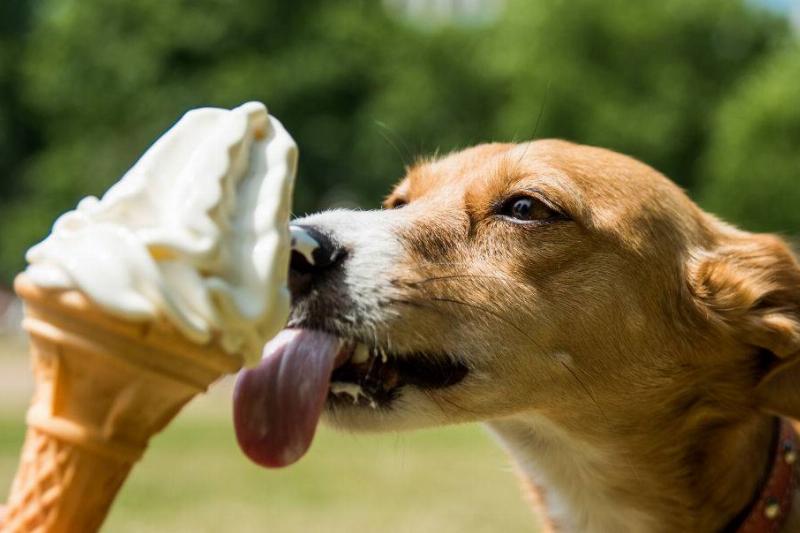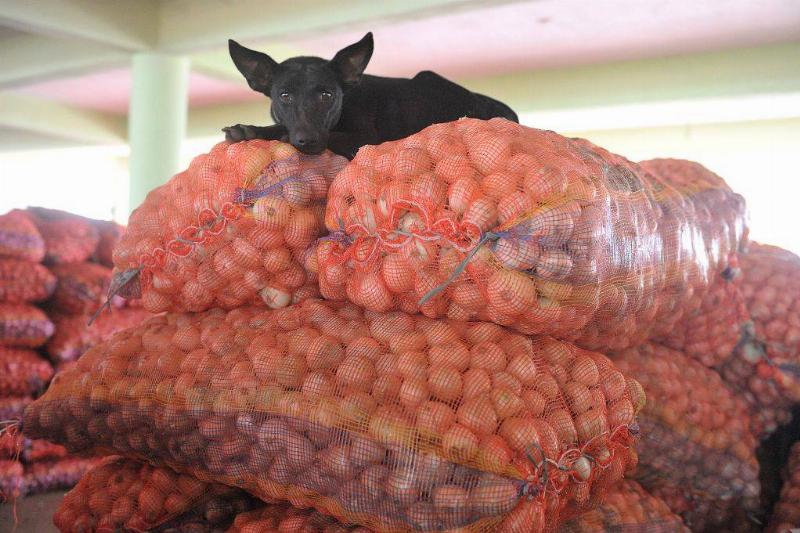There are tons of things pet owners can do to make sure their dogs are happy and healthy, but one of the most important is feeding them nutritious and delicious foods. While there are great wet and dry foods made especially for our canine pals, dog owners might not be aware that there are many human foods they’re allowed to eat. On the other hand, there are several human foods that should never be ingested by dogs because it can quickly lead to life-altering results. These are the human foods that are both okay and off-limits for dogs.
Keep Them Away From The Chocolate
One of the foods that should never be kept near dogs is chocolate. This sweet treat may be a pleasant dessert for humans, but chocolate contains theobromine and caffeine. Dogs cannot metabolize those chemicals and will experience dire symptoms if they do.
The symptoms can include vomiting, dehydration, internal bleeding, muscle tremors, seizures, and in the worst-case scenario it can end their life. There are some varieties that will do more damage such as cocoa powder and unsweetened baker’s chocolate because they are more concentrated.
White Rice Helps With Upset Stomachs
Similar to humans, dogs can also experience upset stomachs, especially if they are eating the wrong foods or if there is a drastic change in their diet. A human food that can aid an upset stomach for dogs is cooked white rice.
After they digest the bland white rice dogs’ stool will firm up and give them the nourishment they may be missing out on from their normal food. The carbohydrates from the rice also provide a good source of energy, especially for older dogs. Make sure to not mix this up with brown rice because it has a higher glycemic index, which causes blood sugar to rise.
Avoid Avocado At All Costs
There are a lot of mixed opinions on whether or not dogs are allowed to eat avocado, but more credible sources urge owners to keep it out of their dogs’ diets. The most common reason experts tell people to not give their dogs avocado is that it contains a fungicidal toxin called persin.
Persin is all over the different parts of the avocado and can cause vomiting, blockage in the heart, and even end their lives. The high amount of fat in avocado is also detrimental because it can upset their stomach, pancreas, and cause weight gain.
Keep The Carrots Coming
Carrots are one of the best foods to incorporate into a dog’s diet. This orange vegetable is packed with vitamins, fiber, antioxidants, and more. Not only do dogs get a lot of health benefits from it, but it’s also perfect for rewarding good behavior.
If you have a puppy who’s teething, a frozen carrot can serve as a refreshing cold object to help them with the pain and also help improve their dental health. Before serving, it’s best to cut the carrots down into bite-size chunks to make sure they don’t choke.

Why Ice Cream Is Damaging For Dogs
While it may be tempting to let your dog enjoy some ice cream on a hot day, it’s actually something they shouldn’t be eating. Many dogs are lactose intolerant because they are weaned off milk after the first couple of months of their lives.
Eating ice cream or similar milk products can lead to gas, bloating, constipation, vomiting, and more. Ice cream is also filled with sugar or sweetener, which is extremely toxic for dogs. Luckily, there are a few ice cream substitutes made especially for pups.

Pass The Peanut Butter
Peanut Butter is something that will have your dogs smacking their lips all day long, but there are some things to know before giving it to them. It can be a healthy treat if it’s done in moderation. Veterinarians recommend feeding them plain, unsalted peanut butter because extra ingredients such as salt and sugar can have adverse effects.
This creamy snack can be used to help them take medication or reward them for good behavior. It’s best to remember that peanut butter does contain high amounts of fat and calories, which can lead to weight gain and an upset stomach.
Grapes And Raisins Are A No-Go
Sometimes a dog can recover if they have a small amount of a certain food they’re not supposed to have, but that’s less likely if they come into contact with grapes or raisins. These are very toxic to dogs and can cause kidney failure and an untimely passing.
If you’re not sure if your dog ate grapes or raisins there are some symptoms that will make it clear. These include loss of appetite, being weak or still, vomiting, abdominal pain when touched, dehydration, frequent urine production, and more. The best thing to do if your dog experiences any of these symptoms is to contact a veterinarian.
It’s Time To Whip Some Eggs
A common human food that can make a positive difference in a dog’s diet is eggs. They are very high in protein and contain essential amino and fatty acids. Eggs are great for helping an upset stomach and nausea, but there are a few things to know before preparing them for your dog.
Eggs should never be served raw because they can have salmonella and lead to a biotin deficiency, which affects skin, digestion, metabolism, and cells. They should also be prepared without milk or butter because most dogs are lactose intolerant.
Don’t Cry Over Onions
One of the most toxic foods for dogs is onions. Whether they are raw or cooked they can do horrible things to their bodies such as causing their red blood cells to rupture. If that happens it cuts off their oxygen flow preventing them from breathing. The toxins are in all parts of the onion and can also be found in onion powder, garlic, shallots, leeks, and chives. Some ways to tell if a dog has eaten onions is if they are lethargic, don’t have an appetite, are fainting, have reddish urine, or pale gums.

Put Some Shrimp On The Barbie
Dogs shouldn’t eat large amounts of shrimp, but a few every now and then have some proven health benefits. Shrimp contain vitamins B12 and B3, anti-oxidants, and phosphorus, which helps with metabolism, energy, blood circulation, bones, and brain function. They are also low in fat, calories, carbohydrates, and cholesterol.
Before feeding them to your dog it’s best to steam them thoroughly and remove any shells to prevent choking. Do not cook them in oils or butter because that provides unnecessary fats that can be harmful to their digestive system.
Let Them Eat Turkey
Turkey is rich in several nutrients such as protein, riboflavin, and phosphorous. If you have extra turkey, then get ready to give some to your dog. Turkey is fine for dogs to consume, but there are a few conditions. It must be plainly cooked. This means no butter, salt, pepper, herbs, or spices because it can upset their digestive system and do damage to their pancreas. Before feeding it to them it’s crucial to check for bones, so they don’t choke.
When Life Gives You Lemons And Limes
Dogs cannot tolerate eating lemons or limes. The skins of these citrus fruits include a substance called psoralen. Eating just small amounts of psoralen can cause vomiting and gastrointestinal issues, but the more serious symptoms come if larger amounts are ingested. These can include muscle tremors, difficulty walking, liver failure, and fatality.
Chop Up Some Broccoli
Dogs don’t necessarily need to have large quantities of fruits and vegetables to remain healthy, but it doesn’t hurt to incorporate some into their daily meals and snacks. Broccoli is something dogs can eat both raw and cooked because it’s rich in fiber and vitamin C and low in fat.
Broccoli should always be served plain without oils or seasonings and cut into small pieces to avoid choking. The florets of the broccoli contain isothiocyanates, which can cause digestive issues if consumed in large amounts. Combining broccoli with some white rice and lean protein can work as a healthy meal option.
Steer Clear Of Macadamia Nuts
Many dog health sites list macadamia nuts as one of the top human foods to avoid giving to dogs because of the numerous risks. Experts are still trying to pinpoint the exact substance that causes the negative side effects, but even a small serving of macadamia nuts can be fatal.
Other symptoms can include vomiting, loss of balance, weakness, hyperthermia, and depression. The first thing to do if you suspect your dog ate macadamia nuts is to immediately contact the veterinarian. If the symptoms aren’t as severe, activated charcoal and medicine that makes them purge their system are recommended.
Blueberries Help Dogs With Their Weight
It can be difficult to curb the appetite of an overweight dog and something that can fool them into thinking they’re getting a sugary treat are blueberries. This fruit is packed with antioxidants that can help reduce inflammation and it gives their bodies several important vitamins and minerals.
Blueberries are actually low in sugar because they are almost all water. Since they are bite-sized they can be used as a treat and in dog puzzle toys. Some studies have found that blueberries have reduced signs of aging in senior dogs as well.
Don’t Let Your Dog Go Near Cinnamon
Even though cinnamon isn’t toxic to dogs it can still cause many adverse effects. Cinnamon and other cinnamon-related foods can potentially cause skin and digestive irritation and hurt the inside of their mouths. Inhaling the powder can make them cough, choke, and prevent them from breathing.
Smaller breeds are at more of a risk because they can’t handle large dosages as well as bigger breeds. Eating cinnamon can also lower a dog’s blood sugar levels and lead to vomiting, uneven heart rates, and liver disease.
The Great Benefits Of Salmon
Salmon is a staple in several human diets and it can work wonders for dogs. They should only eat it cooked without any seasonings, extra oils, lemon, or butter. It’s also important for owners to remove any of the little bones that may be hiding to prevent choking.
There are a ton of nutritious parts to salmon such as the omega-3 fatty acids, which can reduce inflammation and protect their skin and fur. Dogs who eat raw salmon may be at risk because there are sometimes poisonous parasites inside, which can be fatal.
Garlic Won’t Do Your Dog Any Favors
Although garlic has proven health benefits for humans it won’t work the same way for dogs. They metabolize food in a different way, so ingesting garlic can be very toxic for their digestive system. A substance called thiosulfate in garlic will cause damage to their red blood cells.
Some signs to look out for if your dog may have ingested garlic include rapid breathing, weakness, jaundice, vomiting, abdominal pain, depression, dehydration, and more. Usually, a dog will have to eat a large amount of garlic to feel sick, but every dog is different in their tolerance.
Say Cheese!
While most dogs tend to be lactose intolerant one of the few dairy products they can eat is cheese. It’s filled with protein, calcium, vitamins A and B, and essential fatty acids. Most veterinarians recommend only feeding dogs cheese in moderation because too much dairy can give them gastrointestinal problems.
Cheese is also perfect to use to motivate your dog’s good behavior or as a little snack during the day. Experts stress that moderation is key with cheese because of its high-fat content that can lead to fatal illnesses in dogs.
What Goes Wrong When Dogs Consume Caffeine
Caffeine can be found in coffee, tea, soda, medication, and more and is one of the most dangerous threats for dogs. Caffeine contains a toxin called theobromine that can cause hyperactivity, restlessness, vomiting, elevated heart rate, increased blood pressure, abnormal heart rhythms, tremors, hyperthermia, seizures, and collapse. The side effects are very similar to when dogs consume chocolate. The best thing to do if your dog ingests caffeine is to contact a veterinarian who can advise which medication will help them ease their specific symptoms.
SOURCE: HEALTHYGEM.COM
